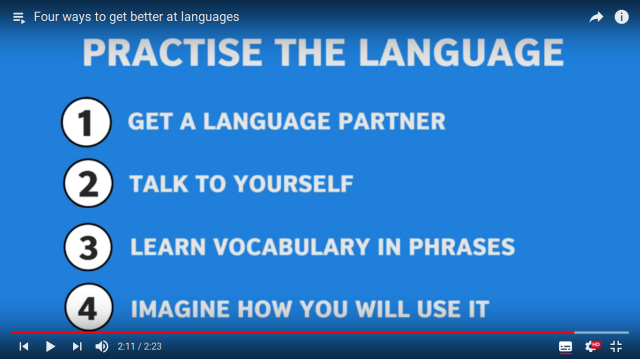A friend, who is soon to be leaving Georgia made an observation on Facebook:
Things I won’t miss #2 – while shopping at Carrefour Vake yesterday (where there were no carts available whatsoever), three employees answered my inquiries, spoken in perfectly understandable albeit accented Georgian, in equally heavily accented English. I usually let this go and just respond in English, because otherwise I would be arguing with every other person I speak to. But since I’m leaving, what the hell. I said to them, in Georgian – “I’m speaking Georgian, right? So why are you speaking English?” I said it with a smile, and to my surprise, each kind of laughed ashamedly and nodded, and switched to Georgian. Maybe I should have been doing this all along. My Georgian language skills would have gotten a lot more practice, and no doubt would be much stronger.
An observation – in Spain, this never happened. My son speaks passable Spanish, probably about as good as my Georgian (in other words, not very – he tells everyone to speak to him as if he were a child), but not one waiter, taxi driver or anyone else spoke to him in English once he started the conversation in Spanish. Ever. They respected his attempt to speak their language and easily tolerated his mistakes, even when they required a bit more work in communicating, and even though some of them in fact did speak English and could have switched. He appreciated this, and so did I.
I responded with my own observation:
When I ask questions in Georgian like “რა ღირს?” [How much?] the answer given is almost always in Russian…
A second commenter wrote:
I think a part of this is that Georgians simply aren’t accustomed to hearing non-native speech in their language, unlike speakers of English or other larger and international languages. It creates a kind of cognitive dissonance, and they’ve never thought about using context to figure out what the non-native speaker is trying to say in the case of the slightest mistake or even mispronunciation.
To which my friend replied:
I think you are right in many cases. An alternative theory, uniformly advanced by my Georgian friends, is that if a Georgian speaks even a little English, they have a strong need to show it off. My Peace Corps friends thought that people who did this were trying to be helpful, but I am of the opinion that this theory was wishful thinking. I mean, if you speak Georgian and you are understandable, how does answering the question in English (thereby demonstrating that the question was understood – in Georgian) help anything?
To which the second commenter replied:
I think they are trying to be helpful, and at the same time fundamentally feeling that a foreigner can’t possibly speak Georgian beyond a few words, if that. It’s kind of like when a cat or dog makes a sound that sounds kind of like speech – it’s cute, but beyond that you’d want to help the poor animal out, because it’s obviously an isolated occurrence  😉
😉
There is probably too an element of showing off their English sometimes, even if it’s quite minimal. Sometimes the opposite happens too, when the Georgian is terrified and thinking “God, I have to speak with this foreigner in English” and in the momentary panic it doesn’t register that the foreigner is actually speaking to them in their language.
A third commenter observed:
I was also always answered in Russian. Not many people in Khashuri outside of the schools speak English. An exchange I had a a regular basis – Me: some question… Them: something in Russian… Me: არ ვიცი რუსული (I don’t speak Russian) Them: უუფფ მე არ ვიცი ინგლისური. (I don’t know English) Me: ეხლა ვლაპარაკობ ქართულად. ვიცი ქართული (Now I’m speaking in Georgian. I know Georgian.). I honestly had to tell people two or the times in a conversation that I spoke Georgian. There is a woman at the fruit and veggie market who would tell everyone around that we (me and the other volunteer in the town) spoke ever improving Georgian. Every time we entered that building someone would run through looking for a person who spoke English to help us. I think the theory that Georgians aren’t practiced in hearing people from outside of the country speak there language has a lot of merit. People look at me and immediately know I wasn’t born anywhere near Georgia, so obviously I don’t know any. Why would I?
My friend added:
Oh, haha, so so true. One old lady (not me) selling vegetables at a stand on my way home spoke to me in Russian for a whole year, each time we had the same discussion you describe, before she finally capitulated and started speaking to me in Georgian. Another time, a Gori taxi driver got mad at me when I gave him my address and directions in Georgian and I didn’t understand when he tried to confirm the street number in Russian. I could go on …
A fourth commenter remarked:
I agree with pretty much all of these interpretations. As for the Russian reply, I discovered the best response some years ago, and it works extremely well ( i.e., quickly): “უკაცრავათ – მე ვფიქრობდი რომ ქართული იციდით. მე რუსული არ ვიცი. როგორ შეგვიძლია ვილაპარაკოთ (I’m sorry – I thought you were Georgian. I don’t speak Russian. How can we talk)?” This results immediately in an answer in Georgian, either an indignant “მე ქართველი ვარ – რა თქმა უნდა ქართული ვიცი.(I am Georgian – of course I know Georgian!)” Or they’ll say “ბოდიში, ვფიქრობდი რომ რუსი ხართ – რუს გავ ხარ…(Sorry, I thought you were Russian…)” But they always then switch to Georgian. As for when they insist on answering in English, my reaction has been to respond like you S. – to discuss it (in Georgian) – “I was speaking Georgian, so why are you answering in English,” then blah blah. Now that I think about it though, the response I give when they answer in Russian would probably do just as well. Another merit btw is that if the person is an ethnic minority and really doesn’t speak Georgian well, it in fact quickly identifies the problem in a relatively sensitive and considerate way.
To which the second commenter added:
The irony (or paradox?) is that the foreigners who speak (or want to speak) Georgian complain that people speak Russian to them, while those who speak (or want to speak) Russian complain that nobody speaks Russian in Georgia.
Another oddity I’ve noticed is that (as in the above examples) the default is often to speak Russian to foreigners (wherever they may be from), and at the same time people seem genuinely surprised when foreigners (who aren’t Russians) can actually speak Russian competently.
This exchange illustrates some of the difficulties Georgian learners encounter in Georgia, where locals are not used to foreigners who wish to converse in Georgian and may reply in English or Russian. I found these observations interesting so I’m sharing them here.






